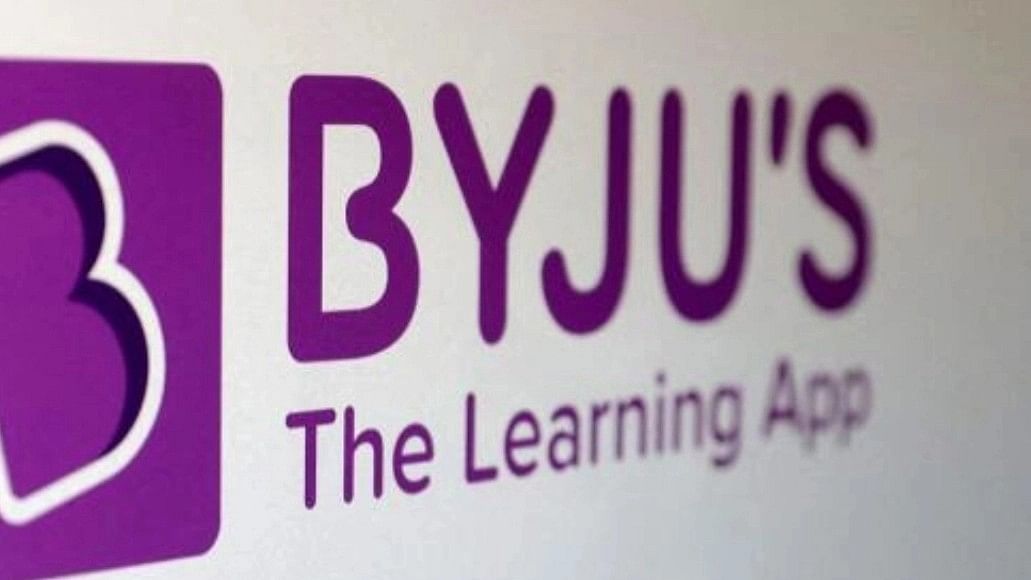
The Byju's logo.
Credit: Reuters Photo
New Delhi: The Supreme Court on Wednesday set aside National Company Law Appellate Tribunal's order which had halted the insolvency proceedings against edtech major Byju's by approving Rs 158 crore dues settlement of the company with the BCCI.
A bench of Chief Justice of India D Y Chandrachud and Justices J B Pardiwala and Manoj Misra held the NCLAT could not have used its inherent power to allow the settlement, contrary to carefully crafted legal procedure for withdrawal of insolvency proceedings.
"Even if the procedural infirmity is kept aside, once the CIRP (Corporate Insolvency Resolution Process) was admitted, the proceedings became collective, and all creditors of the corporate debtor became stakeholders. Even while invoking Rule 11 (NCLAT Rules, 2016) to allow withdrawal, the NCLT must hear all the concerned parties and consider all relevant factors on the facts of each case," the bench said.
The court noted appellant US based creditor firm raised detailed objections before the NCLAT to the source of the funds for the settlement and a reasonable apprehension that there was round tripping of funds, in violation of the order passed by the Delaware Court on March 18, 2024.
However, the bench said, "These objections were summarily dismissed by the NCLAT, relying solely on the undertaking filed by Riju Raveendran."
The court also pointed out alleged facts such as the fraudulent transfer of $533 million to a hedge fund in the United States; the orders of the US Court restraining the brothers (Byju and Riju, former directors) from transferring or dissipating the amount; the contempt proceedings against Riju; the ongoing investigation by the Enforcement Directorate against the first respondent, Byju and the corporate debtor (Think and Learn Pvt Ltd) and other attempts by the corporate debtor to dissipate assets, were not adequately addressed by the NCLAT.
Allowing the appeal, the court directed the BCCI to deposit the settlement amount of Rs 158 crore, along with interest, if any, with a committee of creditors (CoC), constituted during the proceedings before this court.
"The parties are at liberty to invoke their remedies, to seek a withdrawal or settlement of claims, in compliance with the legal framework governing the withdrawal of CIRP. Nothing in this judgment should be construed as a finding on the conduct of any of the parties or other stakeholders involved in the insolvency proceedings," the bench said.
The court directed the CoC to maintain the amount in an escrow account until further developments and to abide by the further directions of the NCLT.
The court's judgment came on an appeal by US-based creditor firm Glas Trust Company LLC against the NCLAT order.
The bench ordered fresh adjudication in the case after finding that the NCLAT did not apply its mind while closing the insolvency proceedings against the ed-tech major.
"At this stage, it would not be appropriate for this court to adjudicate on the objections of the appellant to the settlement agreement on merits. The issues raised are the subject matter of several litigations in different fora, including the Delaware Court and investigation by various authorities, including the Enforcement Directorate, which are pending," the bench said.
On August 14, the apex court had stayed the NCLAT's order of August 2, which granted relief to the embattled ed-tech firm by setting aside the insolvency proceedings against it after approving its Rs 158 crore dues settlement with the BCCI.
The dispute between the BCCI and Byju's related to the sponsorship contract for providing jerseys to the Indian Cricket Team.
In its 61-page judgment, the court noted there was no formal application instituted to seek the withdrawal of the CIRP.
"The settlement agreement was taken on record and approved by the NCLAT based on the submissions and assurances of the counsel before it and the affidavits/undertakings filed by the parties," it said.
Further, the court pointed out, the first respondent, Byju, who is a former director of the Corporate Debtor, did not move the application through the IRP and instead approached the NCLAT directly.
"Finally, the request to approve the settlement was moved before the NCLAT during appellate proceedings, instead of being placed before the NCLT. Despite these grave deviations, the NCLAT still proceeded with approving the settlement and setting aside the CIRP by invoking its inherent power under Rule 11 of the NCLAT Rules," the bench said.
The court opined that recourse to Rule 11 of the NCLAT Rules was not warranted in the present circumstances.
"The ‘inherent powers’ cannot be used to subvert legal provisions, which exhaustively provide for a procedure. To permit the NCLAT to circumvent this detailed procedure by invoking its inherent powers under Rule 11 would run contrary to the carefully crafted procedure for withdrawal," the bench said.
